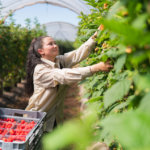Researchers are investigating whether new varieties of fruit being grown in Scotland which can adapt better to climate change have the same health benefits as established family favourites.
Volunteers are needed to take part in the study by the University of Aberdeen’s Rowett Institute which will examine whether honeyberries and cherries have the same impact on our bodies as traditionally grown fruits like raspberries.
Healthy men and post-menopausal women aged between 40 and 70 with a BMI between 18.5 and 39.9 are invited to apply for the four-week study which will investigate the effect on changing sugar levels in the blood and memory recall.
The study is being funded by the Scottish Government’s Rural and Environment Science and Analytical Services (RESAS) division.
Lead researcher Dr Fiona Campbell said: “Raspberries have been grown in abundance in Scotland for many years as we have the ideal climate and the moisture-retentive, fertile conditions these plants relish.
“As our climate changes and the desire among consumers to reap the environmental benefits of increased consumption of locally sourced food continues to grow, understanding the impact this has on changes in our blood glucose and short-term memories is vital.”
You Might Also Like:
Volunteers who participate in the study will be asked to restrict their intake of certain foods over a short period and complete a food diary. They will be given breakfast along with the fruit and lunch on the days they are required to provide blood samples and undergo a series of computer-based memory tests.
It is hoped the data coming from the research will be used to develop public health strategies for improving the health status of the population and the sustainability of Scottish agriculture.
The full criteria for participants can be found on the Rowett Institute web pages or contact Dr Fiona Campbell fiona.campbell@abdn.ac.uk 01224 438617.





















